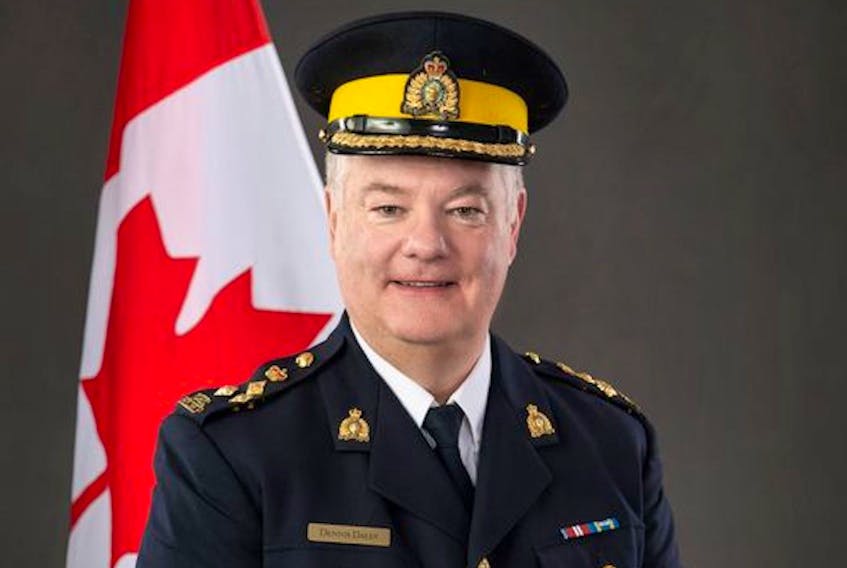The new top Mountie in Nova Scotia has a big job ahead of him.
The Mass Casualty Commission has raised concerns about the RCMP's performance before, during and after the killings that began on the night of April 18, 2020, in Portapique, Colchester County.
The force is struggling with recruitment of new officers and retention of those it has.
Rising policing costs have led multiple municipalities to look at the possibility of replacing the RCMP with a regional, or potentially even a provincial, police force.
SaltWire put four questions to Assistant Commissioner Dennis Daley, a 34-year veteran of the force, as he takes command of H Division.
SALTWIRE: Do you think the Mass Casualty Commission has affected the faith of Nova Scotians in the RCMP?
DALEY: I would acknowledge that there are some that do feel that way. Believe me, I’ve listened and I will continue to listen. My role looking forward, as we look forward to the recommendations, is to look at it as an opportunity to strengthen not only relationships but also the faith that Nova Scotians have for their RCMP and in general for their policing, as well. We’ve co-operated extensively with the inquiry and will continue to do so.
There’s no doubt that there’s relationships to strengthen, whether it be among my own RCMP employees, community members, stakeholders, police chiefs and police organizations. I think leaders are chosen for a specific skill set at a specific time. I would like to think I was chosen for my background in promoting just exactly that and the importance of the relationships.
SALTWIRE: One of the revelations through the Mass Casualty Commission was of poor relations between the RCMP and some municipal police departments. What do you think were the causes of those poor relations and what can be done to alleviate them?
DALEY: That’s a difficult question for me to respond to because I wasn’t here. I was here five years ago, but it isn’t fair for me to comment on where things were five years ago. However, in my recent conversations with a large number of chiefs, and more specifically with the president and vice-president of the Nova Scotia Chiefs of Police Association, they told me some of the narrative left at the MCC might not be as accurate as one would like to portray.
They talked about the relationship being strong, about working together and the need for it to continue and strengthen. However, the (police) chiefs, from what they have said to me, are looking for a voice maybe independent of the RCMP.
I would look to the fact that in any relationship, there is going to be tension points and perhaps disagreements. Nova Scotians need to know this: Each and every day police departments work together. There are integrated units, there is integrated training. We just had the criminal investigation division here with (Halifax Regional Police) and RCMP for a full day of training.
I want Nova Scotians to feel confident their police departments are working together to promote public safety. There are areas to improve, and I did make it a point of saying that I do expect at some point the RCMP is to be voted back onto the (Nova Scotia Chiefs of Police Association). There’s a key role for us to do that. In the interim, we will commit to attend meetings, participate and be good partners. I am very optimistic relationships will come full circle.
SALTWIRE: On the night of April 18, 2020, there was supposed to be a staffing complement of six officers for the Bible Hill detachment and a helicopter available to them. That’s the level of service the residents of Colchester County paid for. Instead, there were four officers on duty and no helicopter available. Through the MCC, we learned that due to staffing shortages, the full complement of officers was never, or very rarely, available. What do you say to the taxpayers who question if they’re getting a good deal for their money?
DALEY: When we talk about a number, it had been determined to promote public safety, four was the number that was acceptable to work that particular evening. I do recognize ( the) taxpayer pays for a certain amount. I think the taxpayer would acknowledge that human beings are going to get sick, human beings are going to go on training. There are going to be times where the six are not there, I would also add, because of our different models and our ability to shift people around.
I do not want to equate it to the response to Portapique. While that is germane, I don’t want to devalue the experience of people who went through Portapique. However, our ability to move people around allows us to augment, to bring in resources from other jurisdictions, (for specialists) for any sort of investigation across the country to come in.
Oftentimes, someone in Colchester might not be aware that ability is coming in to them, and often times not being billed directly back to Colchester. Some of those services are being paid directly by the province when we talk about a specific response.
When we do talk costs of policing, policing is expensive. We recently formed a union. With that comes negotiations and potentially a more level playing field with policing forces across the country, though there is the additional cost. I do believe the model the RCMP employs has multiple efficiencies built into it that actually provides value to the citizens of Nova Scotia.
SALTWIRE: Colchester and Cumberland counties were in the process of their own review, looking at an expanded municipal force, and there’s some talk of a provincial police force. Do you feel you are in the position where you need to justify the RCMP as the main provider of policing across the province, or even that you’re competing against other forms of policing?
DALEY: The way I would respond to that, every municipality has the right to examine their police service, the cost of their police service. It’s no different than when I just moved here, I looked at different cable providers. That’s important, to get value for money. I encourage that.
I’m willing to put the RCMP training, operational skill set and equipment up against any other police service in Canada. I’ve also said this to one police leader just recently, external to the RCMP - we cannot be offended if Colchester or Truro police put in a proposal (to create a regional police force) because they’ve been asked by their political side to put in a proposal. We cannot as police leaders look at it as us versus them. There’s going to be the free choice of selecting a police service of choice. I encourage that. What I would ask is that it be a fair process, it be transparent and it be to promote public safety.
I have been through numerous policing reviews in my career. At times, I find my experience has been senior leaders of all different stripes at times take their eye off the public safety role of policing and look to make it more competitive than it needs to be. That’s when I’ve had experience in the past that I’ve seen a direct increase in violence. It’s hard to say with evidence that that was the cause, that competition in policing was the cause, but when it becomes a significant issue that time is spent on instead of sitting down together to develop strategies to mitigate crime, then in my humble opinion it's working against public safety.
Truly, we are the service deliverers. We don’t get involved in the contract negotiations between the province and Public Safety Canada. We are simply the service providers. So I like to say that I stay in my lane and look to deliver excellent policing and let my actions speak.









